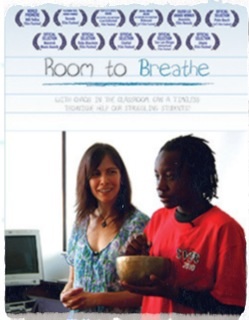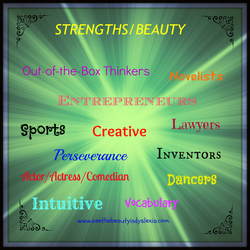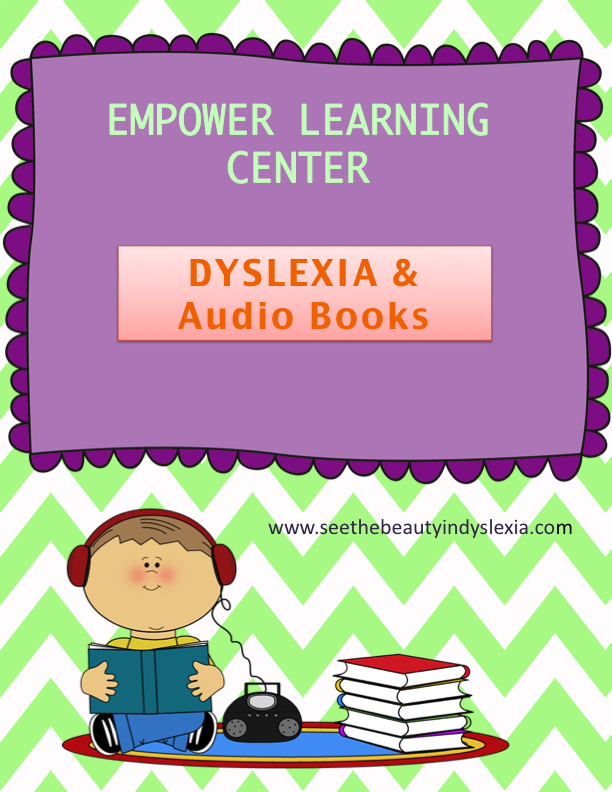
By noticing opportunities and being open to changes, Trice found a way to change careers by the time my son's class moved to the middle school. She began teaching Mindfulness full time through the Crim Foundation and is now reaching hundreds of students.
As a parent, I wanted to see these lessons continue for my son desperately but I also realized the benefits it could bring to his classmates and the trickle down effect it could have on his & their whole school experience; if more kids could learn these lessons, then maybe they'd experience better journeys thru the middle years together. So I wrote a letter to the principals outlining the benefits my small group of Resource Room kids experienced in such a short time through Mindfulness. This program was not expensive, in fact for our school it would be free thru the Foundation she was working with...how can anyone turn down free and beneficial?! It worked, they were signed up and ready to go! Since his class started their lessons in March, his daily frustrations have decreased tremendously. He doesn't bring home papers to re-do that are filled with answers like, "I don't know; or my friends are so much smarter than me." Now, he is more focused, bringing home less unfinished work and trying to think more mindfully about his path in life.
Mindfulness doesn't take away every struggle, he still has issues with really stressful situations and his executive functioning deficits are not miraculously fixed; but the effect that those have had on him are decreased and the turn around is quicker. But most importantly, his self-reflection is improved, he thinks about his reactions and how a different reaction could have altered the outcome. He plans for the next time, execution is still down the road a bit but he's on that higher path.
Let me give you an example: The experience he recently had being on a panel of experts for Michigan Collaborative for Mindfulness in Education (MC4ME.org) is a great example of how he functions & dysfunctions sometimes. Knowing his strengths and weaknesses helps me as his parent to prepare him for moments like these. Initially, when invited, he nonchalantly said, "Sure, I'll do it." which indicated to me that he didn't know what he'd just agreed to. So over the course of the next month and a half we discussed what this might look like. A couple of weeks prior to the event I realized his issues with word retrieval and his disjointed way of explaining things could likely cause him to shut-down in the middle of the crowd and forever embarass him, I panicked, thinking, this could be detrimental to his self-esteem, but, I also couldn't shake the thought that if maybe we prepared well, it could lead to one of the greatest experiences of his young life. So, when I tried asking him some questions that I thought an audience might ask him, he hit the wall--he said, "What?! What do you mean people will be asking me questions?! I can't answer anything like that! I don't know why I like Mindfulness, I just do and I know it helps me but I can't explain it! Tell her I can't do it." Imagine my surprise when after all the times we talked about this, he really still had no concrete idea of what this event was about. So I set out to build the foundation of his thinking with him. I simply asked him to start noticing what Mindfulness does for him or how it makes him feel after practicing. We practiced together a few times a week and he did so on his own. We talked several more times and after a Mindful moment, we would reflect. Each time was, in my opinion, so-so. His answers never reached anything in-depth, just skimmed the surface but he was happy to try to be on the panel and felt he could answer. On the 45 minute car ride down the morning of the event, his in-depth self-reflection surfaced and he astounded me. In this reflection he talked for the first time about his strengths and did not let his dyslexia define him. He talked about the fact that although he has difficulty getting his words on paper and that it is frustrating to him, he has so many good stories in his mind, ready to come out. He recognized that some of his friends who he always felt were so much smarter than him have some weaknesses too and that realization made him accept himself more. He also recognized that he can challenge himself to do more sometimes and isn't letting his challenges with reading, thinking style or writing stop him from getting to his goals (he has goals now --yeah!). I am having a hard time describing the amazing feeling I had listening to him -- awe, pride, thankfulness, admiration that he at such a young age has come so far---relief that maybe he won't have to wait until he's an adult to finally find some successes as a person with dyslexia, like so many people do.
My son has had wonderful teachers all of his schooling and parents who have spent countless hours teaching accountability and self-reflection, in "good-times", although during "bad-times" we often told him to find that calmness and reflect the way he's been taught, none of all that good teaching has been as effective as Mindfulness, which gave him a tool to use, showed him how to make his mind calmer, more able to self-reflect. I'm not discounting any of the lessons he's had from me or any of his teachers, I just think we had to work really hard to get half the results of what Mindfulness has been able to do for him in a short period of time. Executive functioning deficits can't be remediated thru telling one to focus better or calm down, but they can be helped with learning good solid ways to focus, attend to your thoughts, organize, relieve stress, reduce or eliminate racing or wandering thoughts, gain perspectives, and seek the positive in others and yourself.
Aside from my son's experiences, I've seen others......one of the students I work with who has a teacher that does Mindfulness daily stopped shutting-down within the first month of school, a new record for this child. Previously he brought a negative aspect to a classroom, but that ceased by October and has continued to benefit him (&the rest of the class) all school year. The other day, while trying to help a student re-do a Science Study guide, I noticed that his attention was so off that he was unable to keep his eyes on the paper, they were darting everwhere. I attempted to read it to him while using a tracking tool but he was still unable to maintain his attention. I asked if he'd ever heard of Mindfulness, he brightened up, said his 3rd grade teacher did it with them everyday ( he's in 4th now). After a brief discussion of how he could use it to focus on the task at hand, we spent 1.5 minutes in Mindful practice. He listened to the rest of the 2-page paper on the phases of the moon, helped highlight the important parts and answered all 15-20 questions with some assistance within a reasonable amount of time. Without that mindful minute, I believe we would have been at that task well into my next group's session and therefore would not have finished, he would have been on his own and at the rate he was going prior to that, it would have been homework, adding another stressor to the day.
Personally, my experience has been greatly beneficial. Since I began practicing Mindfulness on a daily basis a couple of months ago, I've created this website on dyslexia, written several blogs, learned how to create Facebook, Pintrest and Google pages, helped my children make videos that revolve around dyslexia and learned how to make and post these to my YouTube channel, been asked to present on dyslexia with my Decoding Dyslexia group and made a business plan for the near future. All of these ideas have been mulling around in my head, sort of spinning like a tornado for a few years. The focus that Mindfulness gave me allowed my inner drive to surface. My ideas no longer spin, they are filed away and pulled to the surface when needed. Some escape that and pester for a bit but I am much more aware of when that happens now and either chose to make time to locate and file them, or let them go because I know they will come back or new ones will replace them and it will all be fine. There is peace in knowing that I don't have to tackle every idea. There is peace in being able to focus on something well. There is peace in relieving daily stresses, but more importantly, there is peace in knowing that my overwhelmed son has a tool he can use to help propel himself toward his future.
To see a 3 minute video clip of his MC4ME panel experience, see the Resources tab on my website, www.seethebeautyindyslexia.com




 RSS Feed
RSS Feed
